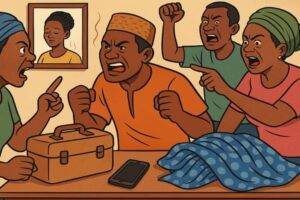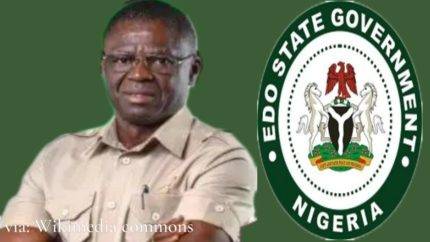Deputy Governor Raises Alarm: Philip Shaibu Raises Alarm Over Alleged Plot to Remove Him from Office
The Deputy Governor of Edo State, Philip Shaibu, has sounded the alarm regarding a purported scheme aimed at ousting him from his position. Philip Shaibu, who recently clinched the factional candidacy of the Peoples Democratic Party (PDP) for the forthcoming gubernatorial election scheduled for September 21, has disclosed that his team has apprised him of looming threats of impeachment. Asserting his fundamental right to contest the election, Shaibu has unequivocally declared his determination to vigorously defend it, thereby setting the stage for a potential legal showdown. Amidst escalating tensions within Edo State’s political arena, Philip Shaibu’s steadfast stance underscores the gravity of the situation and foreshadows the intensification of political strife in the lead-up to the election.
Philip Shaibu, the incumbent Deputy Governor of Edo State, has taken a defiant stand in the face of mounting challenges to his tenure. Expressing grave concerns over alleged attempts to unseat him, Shaibu has emphasized the sanctity of his constitutional entitlement to contest the upcoming gubernatorial election. With his readiness to explore legal avenues to safeguard his candidacy, Shaibu signals a resolute commitment to upholding democratic principles and preserving his political mandate. As tensions simmer within Edo State’s political landscape, Shaibu’s unwavering resolve to assert his rights underscores the significance of the impending legal battle and sets the stage for a contentious electoral process ahead.
Navigating Political Turbulence: The Deputy Governor’s Impeachment Saga
In the ever-evolving landscape of Nigerian politics, the recent revelation by the Deputy Governor regarding looming impeachment threats has catapulted him into the center stage of a tumultuous power play. By asserting his constitutional prerogatives, Shaibu has inadvertently ignited a fierce backlash from influential factions within the political arena. Their purported machinations to oust him from office underscore the high stakes involved in his candidacy and the broader power struggles at play. Amidst the looming specter of impeachment, Shaibu’s steadfast commitment to upholding his rights not only showcases his resilience but also highlights the precarious balance of power characterizing the run-up to the governorship election.
As the political tides continue to ebb and flow, the specter of impeachment casts a foreboding shadow over the already charged atmosphere preceding the gubernatorial contest. The Deputy Governor’s unwavering stance in the face of mounting pressure reflects the intricate interplay between personal ambition and vested interests in Nigeria’s political landscape. With each maneuver and countermove, the dynamics of power are laid bare, exposing the intricate web of allegiances and rivalries shaping the trajectory of Shaibu’s candidacy.
In this crucible of political intrigue, the ultimate outcome remains uncertain, but one thing is clear: the Deputy Governor’s resilience in the face of adversity will undoubtedly leave an indelible mark on the annals of Nigerian political history.
Philip Shaibu’s Legal Resolve Amid Perceived Threats
Deputy Governor Shaibu’s unwavering commitment to pursuing legal action in response to perceived threats signals a firm stance on upholding democratic principles. By expressing his readiness to seek legal redress, Shaibu underscores the importance of judicial oversight in interpreting constitutional matters, particularly in the context of electoral disputes. His determination to defend his right to contest the election highlights the vital role of legal mechanisms in safeguarding the integrity of democratic processes, ensuring that political contests adhere to legal frameworks and constitutional norms.
Philip Shaibu’s emphasis on the role of the courts in resolving political disputes reflects a broader recognition of the judiciary’s crucial function in maintaining the rule of law. By turning to legal avenues for recourse, he reinforces the idea that disputes within the political sphere should be adjudicated through established legal channels rather than resorting to extrajudicial or confrontational means.
This approach not only promotes stability and adherence to democratic principles but also underscores the resilience of legal institutions in upholding the sanctity of electoral processes. Shaibu’s stance serves as a reminder that in a democratic society, the rule of law remains paramount, offering a pathway for peaceful resolution and ensuring the continued functioning of democratic governance.
Political Turmoil Unfolds in Edo State: Understanding the Impeachment Attempts on Philip Shaibu
The reported attempts to impeach Shaibu illuminate the deep-seated political strife enveloping Edo State. Amidst a landscape rife with factional rivalries and power struggles, the specter of political instability casts a foreboding shadow over the region. These efforts to remove Philip Shaibu from office represent more than mere internal discord; they serve as poignant indicators of a state grappling with its political identity. As factions vigorously compete for control and influence, the stakes of this power struggle extend far beyond the confines of the statehouse, reverberating throughout the broader political landscape.
At this critical juncture, Edo State finds itself at a crossroads, poised on the brink of significant political transformation. The unfolding developments surrounding Philip Shaibu’s impeachment underscore the pivotal nature of this moment, with reverberations that will be felt well beyond the upcoming election cycle. As the state navigates through these turbulent waters, the outcomes of these power dynamics will shape its political trajectory for years to come, leaving an indelible mark on the fabric of Edo’s political landscape.
Deputy Governor: Philip Shaibu’s Factional Candidacy and the Divisions within PDP
Philip Shaibu’s emergence as a factional candidate within the People’s Democratic Party (PDP) underscores the profound divisions entrenched within the party’s fabric. This development not only signifies internal discord but also portends a looming threat to the party’s cohesion. The brewing conflict surrounding Shaibu’s candidacy not only exacerbates existing tensions but also poses a significant challenge to the party’s ability to consolidate unity in preparation for the upcoming election. Amidst this tumultuous backdrop, the prospect of forging consensus within the party appears increasingly daunting, casting a shadow over its electoral prospects.
The predicament faced by the Deputy Governor epitomizes the deep-seated intra-party strife gripping the political landscape of Edo State. Shaibu’s candidacy serves as a microcosm of the broader schisms within the state’s political arena, reflecting a broader pattern of fragmentation and discord. As the political dynamics continue to evolve, the Deputy Governor finds himself ensnared in a web of competing interests and factional allegiances, further complicating efforts to navigate the turbulent waters of party politics.
The resolution of Shaibu’s candidacy dilemma holds profound implications not only for the PDP but also for the wider political landscape of Edo State, as it stands as a litmus test for the party’s ability to reconcile internal divisions and present a unified front to the electorate.
Navigating Tensions Through Constructive Dialogue
In times of escalating tensions, the imperative for restraint and constructive dialogue becomes paramount. The looming specter of impeachment, rather than diffusing the situation, threatens to intensify the existing volatility, potentially deepening societal divisions. To navigate these turbulent waters effectively, stakeholders must prioritize peaceful resolutions and commit to engaging in meaningful dialogue.
By fostering an environment conducive to open discourse and mutual understanding, they can mitigate the risks of further polarization and work towards consensus-building solutions. Upholding democratic principles is essential to safeguarding the integrity of the electoral process, ensuring fairness, and maintaining transparency, thereby bolstering public trust and confidence in the democratic institutions.
As tensions escalate, it is imperative for all parties involved to prioritize peaceful resolution over confrontation. The looming threat of impeachment adds another layer of uncertainty to an already volatile situation, necessitating a concerted effort to de-escalate tensions through constructive dialogue. By adhering to democratic principles and upholding the rule of law, stakeholders can create a conducive environment for fair and transparent electoral processes. Embracing inclusivity and mutual respect in discourse is crucial for fostering unity and consensus, thereby laying the groundwork for sustainable solutions to complex challenges. In this climate of uncertainty, the commitment to dialogue and cooperation serves as a beacon of hope, guiding towards a future characterized by stability and resilience.
Table of Contents
Discover more from OGM News NG
Subscribe to get the latest posts sent to your email.














